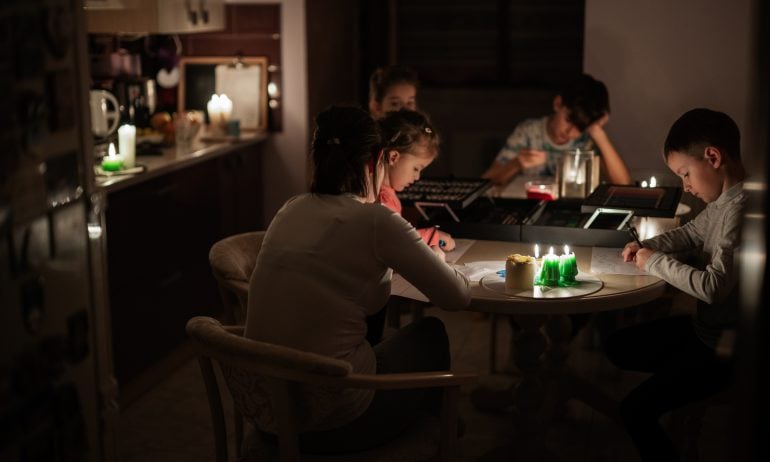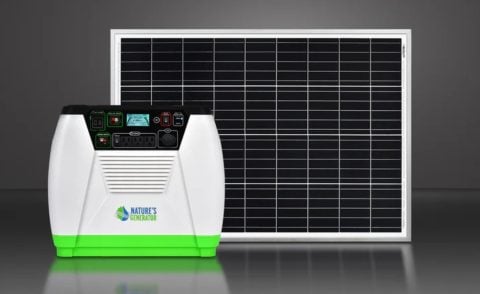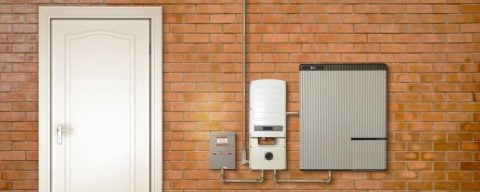Can a House With Solar Panels Use a Generator?

Some or all of the mortgage lenders featured on our site are advertising partners of NerdWallet, but this does not influence our evaluations, lender star ratings or the order in which lenders are listed on the page. Our opinions are our own. Here is a list of our partners.
A house with solar panels can use a generator, but in general you cannot run solar panels and a generator at the same time. Storing excess solar-generated electricity in a solar battery can be an alternative to using a generator.
Here’s what you need to know about using a generator if you have solar.
» MORE: Best solar companies of 2024
Can you have solar power and a generator?
You can have solar power and a generator, but typically you can’t run both systems at the same time.
Most solar panel systems in the United States are installed to shut down during a grid outage. This is so they do not produce electricity that could go back onto the grid during the outage and harm utility workers who are trying to restore power. That means when the power goes out on the grid, you won’t have access to the electricity from your solar panels.
Homes with solar panels can use gas-powered generators to stay online during a power outage. Your solar installer or a qualified electrician can help you set up your generator safely to avoid any problems during a power outage.

A solar-powered generator. Courtesy Nature's Generator.
Generators vs. solar batteries
A popular alternative to having a generator is having a solar battery. Solar batteries store the excess energy that solar panels generate on extra sunny days, and homeowners can tap into this stored energy to keep things such as lights and refrigerators running during a grid outage.
If you want to be doubly prepared for power outages, you can have both a solar battery and a backup generator. But similar rules apply: You cannot run the generator and the solar battery at the same time. When an outage occurs, your battery will kick in first and operate until it runs out of power. Once the battery shuts off, the generator will take over.

A solar battery. Courtesy Sunrun.
Is there a generator that runs on solar and gas?
Many generators need gas to run, but solar-powered generators also exist. A solar-powered generator is just a smaller, portable solar panel system with its own battery storage. It can provide some backup power during an outage at home, but only for a short period of time. Also, “portable” is the operative term here. Solar-powered generators are substitutes for full-size solar panel systems; and they are smaller both physically and in wattage.
A solar-powered generator is best for situations where you don’t have access to a working, hardwired outlet, such as:
Boating trips.
Camping.
Road trips with your RV or camper.
Charging small electronics.
When shopping for generators, keep these things in mind:
Your existing power usage. This will help you think about what you need in order to get by during an outage, which will help narrow the options.
Local codes or requirements. They may limit what you’re allowed to have or what will function on your property.
The watts/wattage rating of your appliances. This will help you figure out if your generator can actually power them. There is usually a sticker on the back of the appliance that tells you how much power it uses. If your generator can produce more watts than your appliance needs, it may be a good fit.
Watt-hours (Wh). This will show you how much energy the solar generator can store. The higher the watt hours, the more energy it stores and the longer it can run your appliances. For example, a generator with a 1,000 Wh capacity can supply enough power to run a 1000-watt appliance (such as a large microwave) for one hour straight or a 100-watt light bulb for 10 hours.
Can you power your whole house with a solar generator?
Yes, you can power your whole house with a solar-powered generator! The average American home requires about 1,214 watts a day, according to the Energy Information Administration (EIA). So, for short-term power outages, a 2,000 watt solar generator should make enough energy to power a typical house.
Generators vary in cost, size and fuel source (gas vs. solar). Small portable units can start around $450, and larger backup generators can cost up to $7,000 plus installation costs.
Types of generators
Here is a breakdown of the various sizes and types of generators (gas or solar-powered), their wattage and what you can expect to power in your home.
Generator type/size (gas or solar) | Wattage | Capacity to power |
|---|---|---|
Small recreational/portable generator or inverter | Up to 2,000 watts. |
|
Mid-sized generator or inverter | Up to 3,500 watts. |
AND
OR one of the following:
|
Large generator or inverter | Up to 7,000 watts. |
AND
OR ONE of the following:
|
Whole-home standby or backup generator | Up to 20,000 watts. | All of the above. |


